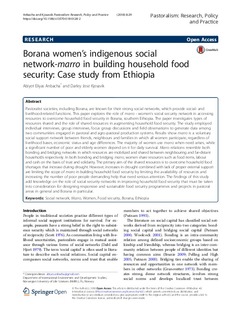| dc.contributor.author | Anbacha, Abiyot Eliyas | |
| dc.contributor.author | Kjosavik, Darley Jose | |
| dc.date.accessioned | 2018-12-20T07:29:28Z | |
| dc.date.available | 2018-12-20T07:29:28Z | |
| dc.date.created | 2018-12-05T14:39:57Z | |
| dc.date.issued | 2018 | |
| dc.identifier.citation | Pastoralism. 2018, 8 (1), . | nb_NO |
| dc.identifier.issn | 2041-7136 | |
| dc.identifier.uri | http://hdl.handle.net/11250/2578393 | |
| dc.description.abstract | Pastoralist societies, including Borana, are known for their strong social networks, which provide social- and livelihood-related functions. This paper explores the role of marro - women’s social security network in accessing resources to overcome household food security in Borana, southern Ethiopia. The paper investigates types of resources shared and the role of shared resources in augmenting household food security. The study employed individual interviews, group interviews, focus group discussions and field observations to generate data among two communities engaged in pastoral and agro-pastoral production systems. Results show marro is a voluntary social support network between friends, neighbours and families in which all women participate, regardless of livelihood bases, economic status and age differences. The majority of women use marro when need arises, while a significant number of poor and elderly women depend on it for daily survival. Marro relations resemble both bonding and bridging networks in which resources are mobilized and shared between neighbouring and far-distant households respectively. In both bonding and bridging marro, women share resources such as food items, labour and cash on the basis of trust and solidarity. The primary aim of the shared resources is to overcome household food shortages that increase during drought. However, increases in drought combined with lack of proper external support are limiting the scope of marro in building household food security by limiting the availability of resources and increasing the number of poor people demanding help that need serious attention. The findings of this study add knowledge on the role of social security networks in improving household food security that must be taken into consideration for designing responsive and sustainable food security programmes and projects in pastoral areas in general and Borana in particular. | nb_NO |
| dc.description.abstract | Borana women's indigenous social network-marro in building household food security: Case study from Ethiopia | nb_NO |
| dc.language.iso | eng | nb_NO |
| dc.relation.uri | https://pastoralismjournal.springeropen.com/articles/10.1186/s13570-018-0128-2 | |
| dc.rights | Attribution-NonCommercial-NoDerivatives 4.0 Internasjonal | * |
| dc.rights.uri | http://creativecommons.org/licenses/by-nc-nd/4.0/deed.no | * |
| dc.title | Borana women's indigenous social network-marro in building household food security: Case study from Ethiopia | nb_NO |
| dc.type | Journal article | nb_NO |
| dc.type | Peer reviewed | nb_NO |
| dc.description.version | publishedVersion | nb_NO |
| dc.source.pagenumber | 12 | nb_NO |
| dc.source.volume | 8 | nb_NO |
| dc.source.journal | Pastoralism | nb_NO |
| dc.source.issue | 1 | nb_NO |
| dc.identifier.doi | 10.1186/s13570-018-0128-2 | |
| dc.identifier.cristin | 1639515 | |
| cristin.unitcode | 192,13,1,0 | |
| cristin.unitname | Institutt for internasjonale miljø- og utviklingsstudier | |
| cristin.ispublished | true | |
| cristin.fulltext | original | |
| cristin.qualitycode | 1 | |

